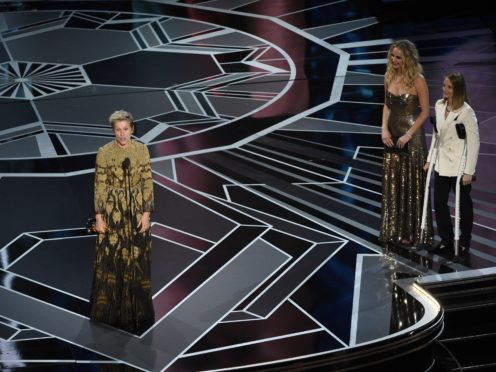Frances McDormand gave a powerful acceptance speech for her best actress Oscar at the Oscars on Sunday night.
Calling on all the female winners and nominees to stand with her as she claimed the prize for her role in Three Billboards Outside Ebbing, Missouri, McDormand finished her speech with a phrase that left some viewers puzzled.
“I have two words to leave you with tonight ladies and gentlemen,” she said. “Inclusion. Rider.”
So what is an inclusion rider?
The phrase was coined by Dr Stacy Smith of the Annenberg Inclusion Initiative of Californian university USC Annenberg in a 2016 TED talk she gave titled “The data behind Hollywood’s sexism”.
Between 2007 and 2015, Dr Smith said she analysed more than 800 films and catalogued every speaking character by their gender, race, ethnicity, sexual orientation and disabilities.
Less than a third of all speaking roles are given to girls or women, she said, despite women making up half of the population. When it came to other demographics, the numbers were even more unbalanced.
For those of you asking about the #InclusionRider, it’s designed to ensure equitable hiring in supportive roles for women, POC, the LGBT community, & people w/disabilities. #DrStacySmith worked with @KalpanaKotagal to craft the language. Contact us to learn more.
— Annenberg Inclusion Initiative (@Inclusionists) March 5, 2018
“Across the top 100 films of just last year, 48 films didn’t feature one black or African-American speaking character, not one,” she said. “Seventy films were devoid of Asian or Asian-American speaking characters that were girls or women.”
The lack of representation among women and minorities amounted to “erasure”, she continued, in which women are overly sexualised.
So she suggested a number of solutions to address the imbalance, including for the most in-demand female stars of the day to demand the realistic representation of women and minorities in their contracts.
“A-listers, as we all know, can make demands in their contracts, particularly the ones that work on the biggest Hollywood films. What if those A-listers simply added an equity clause or an inclusion rider into their contract?”
If you’re wondering what and where “Inclusion Rider” came from, we can tell you. It came from #DrStacySmith and you can learn more here (start at minute 11): https://t.co/SEgm8prEsJ
— Annenberg Inclusion Initiative (@Inclusionists) March 5, 2018
In an ideal world the clause would mean speaking roles in the film would reflect the demographics of the region where the film was set, giving a realistic representation of the world.
“We actually have the ability to change the world on this one,” she said. “The US and its content, films in particular, have captured the imaginations of audiences worldwide.
“So that means that the film industry has unprecedented access to be able to distribute stories about equality all around the world.”
At a time when feminist campaigns like Me Too and Time’s Up are dominating the conversation around Hollywood, McDormand left no question about the direction she wants to see her industry take.
